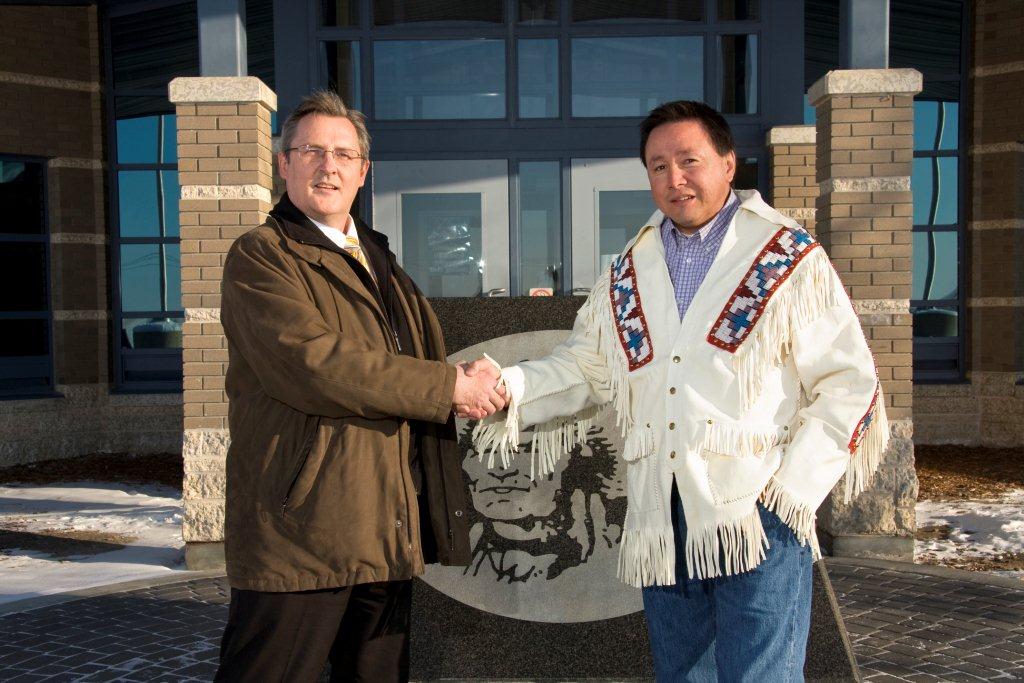
- Encanto President & CEO Jim Walchuck and Muskowekwan Chief Reg Bellerose in joint development of Saskatchewan potash.
After a brief pause, the price of potash is on the rise once again. Demand is now expected to top fifty million tonnes in 2011. Just a few years ago Potash was once a seemingly minor commodity, worth less than $175 a tonne. But with agricultural demand surging, most analysts today expect it will find a price base between $400 and $500 per tonne this year. And Saskatchewan, once habitually depended upon federal transfer payments, is now a relative rock star on the international potash stage because it produces about a third of the world’s annual supply.
In Saskatchewan, the concentration of potash-power, properties and projects, are in the hands of just a few: Potash Corp. (TSX: POT), Agrium (TSX: AGU) and Mosaic (NYSE: MOS) dominate the landscape. But 2008 saw a new entrant on the scene when Encanto Potash (TSXV: EPO) signed its first Exploration Participation Agreements with the Muskowekwan First Nation of Saskatchewan. This was the first step in securing what is, according to Encanto’s President Jim Walchuck, “a collection of properties that offer great exploration and development potential that we simply could not have secured anywhere else in Saskatchewan.”
Many believe this type of arrangement is a modern day necessity in Saskatchewan as dozens of native lands claims are currently under review. Some bands, such as the Cote, Key and Keeseekoose First Nations, have received ground-breaking Federal settlements of up to $80 million.
In resource rich Western Canada, dialogues and partnerships between native groups, industry and government are becoming more common. And that mindset is spreading; the Yukon government recently noted that, “Native groups have demonstrated that they are willing to work with responsible exploration and mining companies and support their projects in exchange for the consideration of benefits to the local community.”
In March, 2011 the first Métis Economic Development Forum was held between business leaders in Saskatchewan and the Métis First Nation. Corporations including world Uranium giant Cameco, SaskEnergy and SaskPower were in attendance. Topics such as partnerships, procurement and community economic development were discussed. Métis National Council President Clément Chartier said, “If we are to begin making a difference in our communities, we need to host frank, open discussions between business and grassroots. It was encouraging to hear industry leaders say they are eager to do business with our people but need their expertise to open the way.”
It’s hard not to notice the tenor of business conversations in this part of the world has become more conciliatory and pro-business. One of Saskatchewan’s more proactive Native groups, for example, the Meadow Lake Tribal Council, owns multiple corporations including NorSask Forest Products. Newly elected Chief Eric Sylvestre recently said he is willing to “Sit down with industry and work out some arrangements”. Sylvestre pointed to oil and gas, and potash as possible areas for future business development and was quick to note when he identified BHP Billiton as a potential partner, “They have a good track record in dealing with First Nations.”
Since securing their arrangement, Encanto Potash has obtained INAC (Indian Northern Affairs Canada) permits on three of its development agreements and, on March 18th, 2011, the company announced its first NI 43-101 resource estimate of 79.1 million metric tonnes of indicated recoverable KCl and 60.5 million metric tonnes of inferred recoverable KCl with a proposed solution mining scenario similar to that of Potach Corp.’s Patience Lake project.
In a recent conversation with the MiningFeeds.com, Encanto head Jim Walchuk said the joint venture with Muskowekwan First Nations was more than just a milestone: “We see our partnership providing many opportunities such as possible tax benefits, a continuous land package and an efficient permitting path with just two stakeholders: Muskowekwan First Nation and Indian and Northern Affairs Canada. Following our recently announced resource estimate on the Home Reserve, we have definitely moved our partnership to a new level. We believe Encanto is in a very enviable position for developing this project.”
Walchuck feels good about his company’s partnership with the Muskowekwan First Nations, a sentiment that is echoed by Muskowekwan Chief Reg Bellerose who said the arrangement “…provides a framework for potash development in our territory, allows our nation to participate and benefit fully, and most importantly, ensures that these developments do not compromise our existing rights, assets, environment and culture. This is a formula our nation can accept and obviously so can industry.” And when describing the benefits to his people Chief Bellerose added, “It is good for a community, it is good for our First Nation, and it is is good for our future. For our children to have an opportunity where they normally wouldn’t.”



 Follow us on Twitter
Follow us on Twitter Become our facebook fan
Become our facebook fan










Comments are closed.